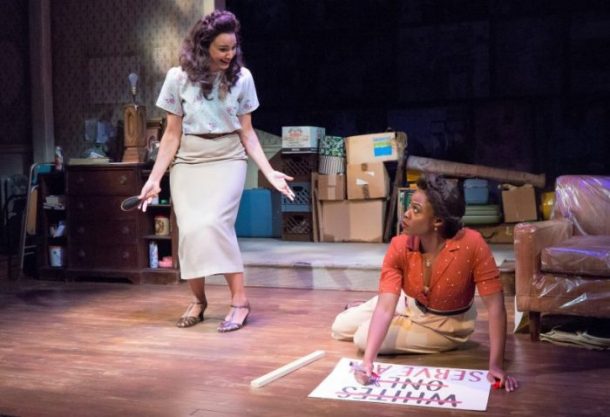
Mud Row by Dominique Morisseau at Peoples Light Theater, Malvern, PA, through August 4, 2019.
Most critics have described this play’s subject as family legacies. That is true. I’d like, however, to describe it from a different angle, because it’s a disservice to the play if we billboard it as only an academic tract about generational relationships.
On a gut level, this is a mystery drama with considerable suspense.
Consider the action. Regine and her husband enter a dark and deserted house. It’s been five years since her mother, Elsie, passed away. Now she had discovered that the deed was put in her name by her mother, and Regine plans to sell it.
Regine and her husband do a walk-through, then depart. In the next scene, a few hours later, a younger couple arrive and we learn that they’ve been occupying the place. They feel it’s theirs. When they see evidence that someone has entered “their” space they decide to use violent means against that person; “we start cracking heads.”
In the next scene, Regine and her husband return and, when they see signs that someone has trespassed on their property, they decide to call the police. Bloodshed is imminent, aggravated by the disclosure that the poachers are Regine’s younger sister Toshi and her boyfriend, who’ve been druggies and criminals. Regine sees Toshi as “a sister addict who stole from me and lied every chance she could get.”
This drama interweaves with alternating scenes from the 1960s where we see Elsie and her older sister who have starkly different approaches to life. Elsie wants to move up to higher social status by marrying an educated man. “He’s opening up a world for me. I won’t be the same.” Her sister Frances, on the other hand, is a confrontational person who says, “The way to change society is to stand with this sign outside Jerry’s Lunch Shop and demand they serve Coloreds or else take a brick through a window.”
Mud Row is cleverly constructed, with stark confrontations and vivid language of poetic strength. It’s set in a black neighborhood in the borough of West Chester Pennsylvania, just a few miles from this theater which is producing the play’s world premiere.
West Chester is the county seat of the overwhelmingly white, patrician Chester County. Its Downtown Historic District is listed on the National Register of Historic Places. The black civil rights leader Bayard Rustin was born and raised in West Chester. The neighborhood called Mud Row is the “Colored area east of the railroad tracks, where all the sewage from the town flows….Coloreds bein’ the mud of the world, livin’ in mud-like conditions.”
Mud Row was commissioned by Peoples Light as part of a series to chronicle the history of the region. Playwright Dominique Morisseau is known for Skeleton Crew (about factory workers in Detroit) which I loved at this theater last summer, and Ain’t Too Proud (about the Temptations) which is a current hit on Broadway.
I won’t give away the outcome of the confrontations, but Regine wants to sell the property because she has negative feelings about her childhood there, while Toshi feels she’s always been an outcast and now wants to plant her feet in that spot. She wants a place where “people that don’t see us as our former selves, don’t believe we’re criminals or scum. I leave here, I go back to the streets. I need this place as much as you need to leave it.” Toshi’s boyfriend is willing to move somewhere else because “that’s just the way the mud flows when you livin’ life vagabond-style.”
Our sympathies tend towards the educated, professional Regine, but we are impressed with the resilience of Toshi as she apparently has reversed her life pattern.
The production directed by Steve Broadnax III features superb acting by Nikkole Salter as Regine, Bjorn DuPaty as her husband, Renika Williams as Toshi, Eric Robinson Jr. as her companion, and Gillian Glasco as the firebrand Frances.
Michael Carnahan’s set is enhanced by the use of family photographs on its walls. Shilla Benning’s costumes define the separate eras. Kathy Perkins’s lighting — using black, white, sepia and magenta — makes the set seem newer in the 1960s and older in the current scenes.
The one flaw was the casting for Elsie. Tiffany Rachelle Stewart has a much lighter skin color than every one of her family members. And she displayed an air of detachment that’s off-putting. She simply didn’t seem to belong.
One of the marks of a good play is that it has you thinking about it a day later. That’s so with Mud Row. We’d like to hear more about Elsie’s marriage. Apparently she and her husband stayed together long enough to have two daughters, but was the man sincerely regretful that he’d previously beaten Elsie?
What precisely was so terrible during Regine’s childhood that she wants to erase all memories of that home?
Toshi appears to be much younger than her sister Regine, and the script specifies that she’s about ten years her junior. What’s with that huge gap?
Another loose end is why that house remained abandoned for years while Toshi was living on the streets of Philadelphia? She knew her old home was empty but didn’t move to occupy it until a few months before the play begins. Why that timing?
This is a world premiere, so the playwright will confront these questions as a matter of course.